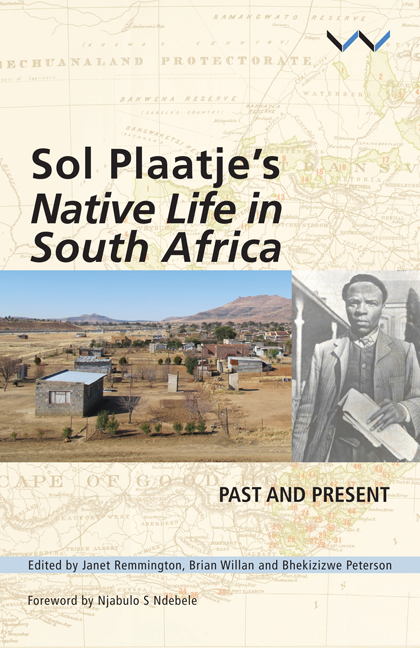Book contents
- Frontmatter
- Table of Contents
- Acknowledgements
- Foreword: Sol T Plaatje and the ‘power of all’
- Introduction: Native Life in South Africa – then and now
- Editions of Native Life in South Africa: 1916 to the present
- Looking Back: Foreword to Ravan Press edition of Native Life in South Africa, 1982
- Poetic Tributes
- What is in a name? In memory of Sol T Plaatje
- Segopoco Sa Moshui Sol T Plaatje
- In memory of the late Sol T Plaatje
- Lefatshe, nkometse
- Earth, swallow me
- Miscellaneous Frontmatter
- Chapter 1 Native Life in South Africa: Writing, publication, reception
- Chapter 2 Modernist at large: The aesthetics of Native Life in South Africa
- Chapter 3 The print world of the press and Native Life in South Africa
- Chapter 4 Going places: Native Life in South Africa and the politics of mobility
- Chapter 5 Native Life in South Africa and the world at war
- Chapter 6 African intellectual history, black cosmopolitanism and Native Life in South Africa
- Chapter 7 ‘Native Lives’ behind Native Life: Intellectual and political influences on the ANC and democratic South Africa
- Chapter 8 Whose past? Native Life in South Africa and historical writing
- Chapter 9 Women and society in Native Life in South Africa: Roles and ruptures
- Chapter 10 African progressivism, land and law: Re-reading Native Life in South Africa
- Chapter 11 Land and belonging: On the tomb ya ga Solomon Plaatje
- Chapter 12 Revisiting the landscapes of Native Life
- A Contemporary Reimagining: The Road to Dikhudung
- Contributors
- Plaatje Resources
- List of Figures
- Index
Chapter 6 - African intellectual history, black cosmopolitanism and Native Life in South Africa
from Poetic Tributes
Published online by Cambridge University Press: 21 April 2018
- Frontmatter
- Table of Contents
- Acknowledgements
- Foreword: Sol T Plaatje and the ‘power of all’
- Introduction: Native Life in South Africa – then and now
- Editions of Native Life in South Africa: 1916 to the present
- Looking Back: Foreword to Ravan Press edition of Native Life in South Africa, 1982
- Poetic Tributes
- What is in a name? In memory of Sol T Plaatje
- Segopoco Sa Moshui Sol T Plaatje
- In memory of the late Sol T Plaatje
- Lefatshe, nkometse
- Earth, swallow me
- Miscellaneous Frontmatter
- Chapter 1 Native Life in South Africa: Writing, publication, reception
- Chapter 2 Modernist at large: The aesthetics of Native Life in South Africa
- Chapter 3 The print world of the press and Native Life in South Africa
- Chapter 4 Going places: Native Life in South Africa and the politics of mobility
- Chapter 5 Native Life in South Africa and the world at war
- Chapter 6 African intellectual history, black cosmopolitanism and Native Life in South Africa
- Chapter 7 ‘Native Lives’ behind Native Life: Intellectual and political influences on the ANC and democratic South Africa
- Chapter 8 Whose past? Native Life in South Africa and historical writing
- Chapter 9 Women and society in Native Life in South Africa: Roles and ruptures
- Chapter 10 African progressivism, land and law: Re-reading Native Life in South Africa
- Chapter 11 Land and belonging: On the tomb ya ga Solomon Plaatje
- Chapter 12 Revisiting the landscapes of Native Life
- A Contemporary Reimagining: The Road to Dikhudung
- Contributors
- Plaatje Resources
- List of Figures
- Index
Summary
In her foreword to the1982 edition of Native Life in South Africa, Bessie Head wrote that while ‘most black South Africans suffer from a broken sense of history’, Sol Plaatje's book provided ‘an essential, missing link’ to that history. For those of us reading Native Life in South Africa a century after its initial publication, what links and lessons might we draw between the book's undertakings and those that animate our anxieties and hopes in the present?
In this chapter I take Head's observation about our experience of history as marred by disjuncture to think through Plaatje's and Native Life's place in African intellectual history and our historical moment. It is important to keep in mind that while Native Life is in many respects a seminal work by one of the county's most important intellectuals, its public life has not been as certain as its reputation. It is not, for instance, a widely taught text in schools and universities. This is not unique to Native Life. Black literary and historical texts have existed alongside but not always within institutions of knowledge. As a result, African intellectuals outside the academy have been compelled to create new archives, re-interpret colonial ones and invent their own audiences. The local challenges faced by African intellectuals, excluded as they were from positions of power, were further compounded by South Africa's articulation with global politics. In Native Life, Plaatje was not only writing a critique that called into question the Natives’ Land Act of 1913 – he was also negotiating the complicated terrain between nation and empire.
The circulation of ideas, travel and texts that marked the making of Native Life map particular colonial, imperial and diasporic routes that suggest something about the complicated context in which black intellectuals worked between the late nineteenth and early twentieth centuries. Plaatje's work as a journalist and author places him, as I see it, in a genealogy of black South African intellectuals that involved precursors and contemporaries such as Tiyo Soga, John Tengo Jabavu, Dr Abdullah Abdurahman and Alice Kinloch. These intellectuals similarly negotiated the tensions and inconsistencies of imperial and colonial rule in South Africa.
- Type
- Chapter
- Information
- Sol Plaatje's Native Life in South AfricaPast and Present, pp. 95 - 114Publisher: Wits University PressPrint publication year: 2016



